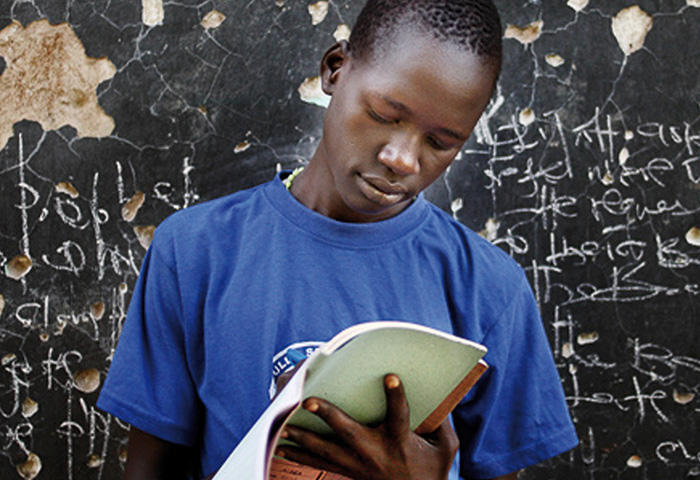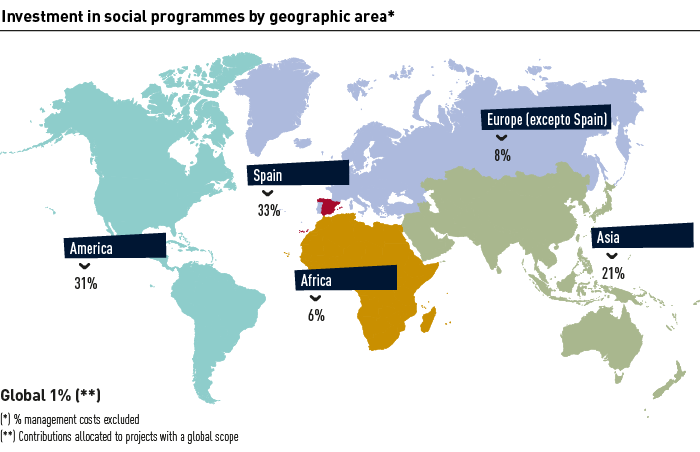Improving community welfare

Objective
To improve the quality of life of people essentially from education, social welfare and humanitarian action.
Opportunity
To maximise the company’s positive impacts on society
Material issues
29. Social action and local community development
30. Dialogue with and commitment to the stakeholders
Inditex believes that investment in community investment is an opportunity to contribute to the development of society by applying its business resources. This understanding of voluntary investment in the community, developed in collaboration with non-profit institutions, focuses principally on education, social welfare and humanitarian action.
Inditex reports its voluntary investment work in the community in line with the LBG (London Benchmarking Group) methodology. Using this methodology, Inditex aims to satisfy the demand of our stakeholders with respect to transparency and comparability of information concerning the community investment in social programmes carried out by the Group.
In 2013, Inditex’s investment in social initiatives exceeded 23 million euros. This was 10% more than the previous year, amounting to 1% of the Group’s net profit in 2013.
As for the type of contributions made, these can be broken down into the following categories:
- Cash contributions: the total amount of money that Inditex allocated to social programmes.
- Time contributions: the proportional cost of the paid working hours employees dedicated to social activities in the community during working hours.
- Contributions in kind: donations of products (mainly clothes) to non-profit entities at cost price.
- Management costs: including the estimated expenses incurred in the general management of social programmes.
In 2013, the most significant cost was cash contributions: 81% of the total. Both cash contributions and time contributions by employees and the corresponding management expenses increased with respect to the previous year.
Inditex classifies its voluntary contributions to the community according to the LBG model into the following categories:
- Charitable gifts: Institutional donations to the general goals of non-profit organisations. These mainly include sponsorship and patronage initiatives, as well as donations of clothes to charity.
- Community investment: A long-term strategic commitment in collaboration with the community to support specific social activities. These include collaboration agreements with non-profit entities for the performance of specific social activities in geographic locations of common interest.
- Commercial initiatives: Initiatives of social interest directly related to the company’s ordinary activity. This mainly includes the for&from programme and environmental programmes related to the communities where the workers of the Inditex supply chain reside.


In 2013, contributions classified as community investments and commercial initiatives increased, while the amount of charitable gifts made by the Group fell. This is explained by Inditex’s intention to give priority to the strategic contributions made in the social area in order to maximise the impact of its investments in the community.
As for the area of activity, 31% of the Group’s investment in the community went to education, 37% to social wellbeing (mainly the promotion of employment amongst vulnerable groups) and 13% to humanitarian aid.
In 2013, in line with the defined social intervention strategy, the strategic focuses of education and social welfare, the basic pillars of Inditex’s investment in the community, were strengthened.
In terms of the geographic area where social programmes are implemented, Inditex gives priority to investment in social programmes in those communities where it carries out its supply activities. In 2013, investment in social programmes in countries where the company’s clusters are located accounted for 73% of Inditex’s total investment.
Programmes related to investment in the community directly benefitting more than 750,000 people were implemented with the collaboration of more than 300 non-profit organisations.
| Type of contribution (*) | 2013 | %2013 |
| Cash | € 18 957 306 | 81% |
| Time | € 790 274 | 3% |
| In kind | € 3 395 434 | 14% |
| Management costs | € 406 800 | 2% |
| TOTAL | € 23 549 814 | 100% |
| Performance (**) | 2013 | |
| No. of children in education | 56 370 | |
| No. of people receiving occupational training | 52 510 | |
| No. of migrants, refugees and displaced people attended | 180 235 | |
| No. of people receiving healthcare | 386 097 | |
| No. of employees generated as beneficiaries of social initiatives | 6 283 | |
| Category | 2013 | %2013 |
| Charitable gifts | € 8 110 244 | 35% |
| Community investment | € 13 445 072 | 58% |
| Commercial initiatives | € 1 587 698 | 7% |
| TOTAL | € 23 143 014 | 100% |
% management costs excluded
| Area of activity | 2013 | %2013 |
| Education and youth | € 7 068 007 | 31% |
| Health | € 866 707 | 4% |
| Social economic development | € 1 954 965 | 8% |
| Environment | € 777 854 | 3% |
| Art and Culture | € 910 771 | 4% |
| Social wellbeing | € 8 529 377 | 37% |
| Humanitarian aid | € 3 018 963 | 13% |
| Other areas | € 16 370 | 0% |
| TOTAL | € 23 143 014 | 100% |
% management costs excluded
| Geographical area | 2013 | %2013 |
| Spain | € 7 625 649 | 33% |
| Europe (excluding Spain) | € 1 803 485 | 8% |
| America | € 7 311 434 | 31% |
| Africa | € 1 300 448 | 6% |
| Asia | € 4 784 801 | 21% |
| Global | € 317 197 | 1% |
| TOTAL | € 23 143 014 | 100% |
% management costs excluded
| Outputs | 2013 | 2012 | % Variation |
| Total number of hours dedicated to social
initiatives by employees during working hours |
26 385 | 19 320 | 37% |
| Total number of social initiatives performed | 455 | 494 | -8% |
| Number of garments donated to social causes | 648 072 | 615 404 | 5% |
| Total number of direct beneficiaries (**) | 756 185 | 740 475 | 2% |
| Total number of beneficiary non-profit organisations |
313 (***) | 394 | -21% |
(*) Inditex’s investment in social programmes includes cash contributions, contributions in kind, time and management costs given voluntarily by the Group in favour of social causes. The exchange rates at the close of the year were used to convert the data of the outlays made by Inditex Group entities in countries outside the euro zone. Outlay criterion is applied.
(**) Indicators corresponding to projects of community investment and commercial initiatives. This indicator does not include charitable gifts to social causes.
(***) Figure corresponding to the number of entities directly benefited by Inditex. In the case of several collaborations with different local, national or international delegations of a single federation, only one organisation was considered for the purposes of the calculation
Further information at http://www.inditex.com/en/sustainability/community
